University of Dhaka MGT-401: Evolution of Management Theories
VerifiedAdded on 2021/11/23
|21
|6986
|133
Essay
AI Summary
This essay, submitted by a student from the University of Dhaka's Department of Management, provides a detailed analysis of the evolution of management thoughts and theories. It begins by defining management and tracing its origins back to ancient civilizations, highlighting the early applications of management principles in Sumerian, Egyptian, and Roman societies. The essay then explores the impact of the Industrial Revolution on management, emphasizing the need for formal management theories in response to the growing complexity of businesses. It delves into early management writings, including the works of Sun Tzu, Chanakya, and Machiavelli, and their influence on managerial thought. The essay further divides the evolution of management into four stages: pre-scientific management, classical theory (including scientific, administrative, and bureaucratic models), neo-classical theory, and modern theory. It examines the contributions of pioneers from the pre-scientific period such as Charles Babbage, Robert Owen, and Henry Robinson Towne. The essay then discusses the classical theory, focusing on Taylor's scientific management and the contributions of figures like F.W. Taylor and Henry Fayol. This comprehensive overview offers valuable insights into the historical development and key concepts of management.
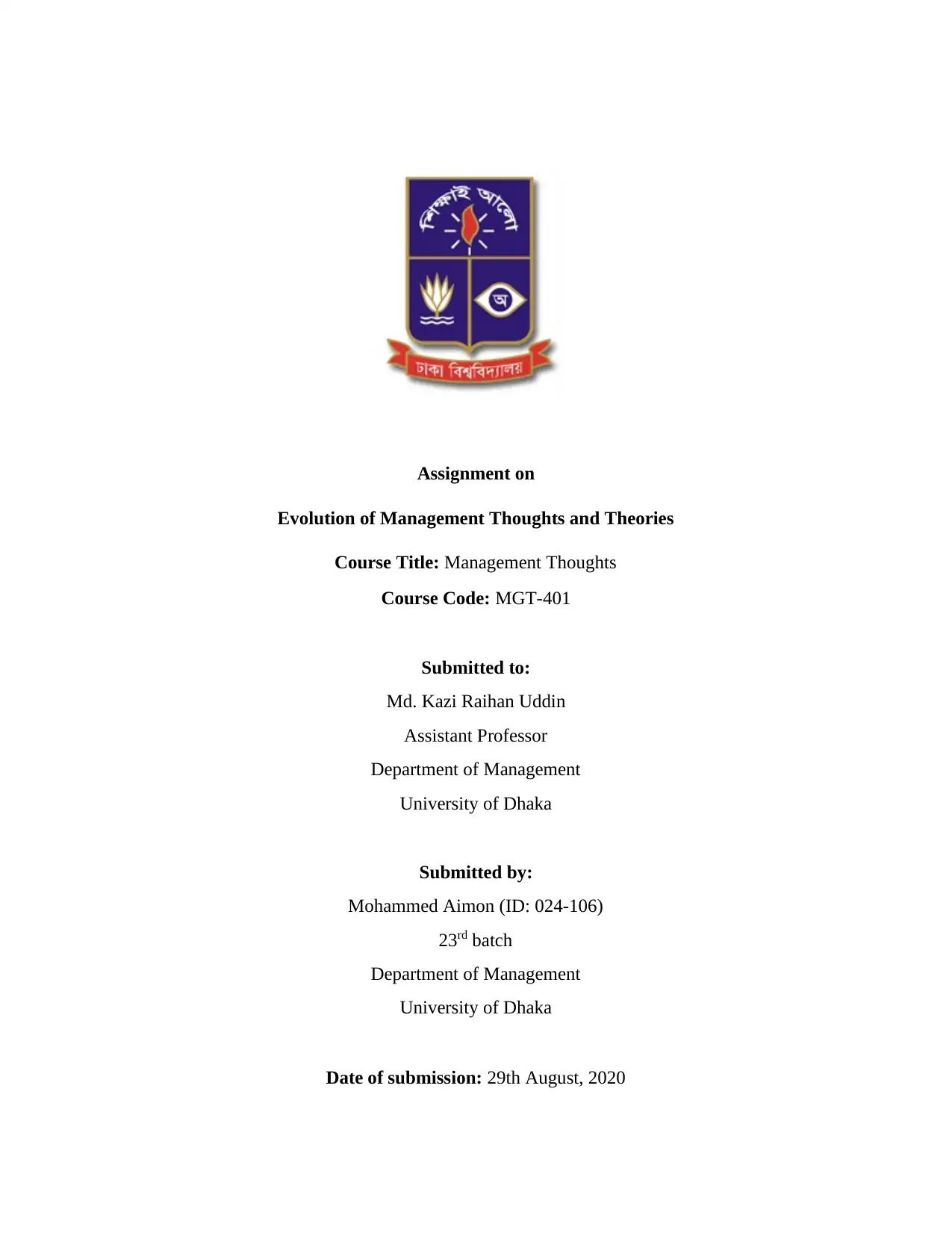
Assignment on
Evolution of Management Thoughts and Theories
Course Title: Management Thoughts
Course Code: MGT-401
Submitted to:
Md. Kazi Raihan Uddin
Assistant Professor
Department of Management
University of Dhaka
Submitted by:
Mohammed Aimon (ID: 024-106)
23rd batch
Department of Management
University of Dhaka
Date of submission: 29th August, 2020
Evolution of Management Thoughts and Theories
Course Title: Management Thoughts
Course Code: MGT-401
Submitted to:
Md. Kazi Raihan Uddin
Assistant Professor
Department of Management
University of Dhaka
Submitted by:
Mohammed Aimon (ID: 024-106)
23rd batch
Department of Management
University of Dhaka
Date of submission: 29th August, 2020
Paraphrase This Document
Need a fresh take? Get an instant paraphrase of this document with our AI Paraphraser
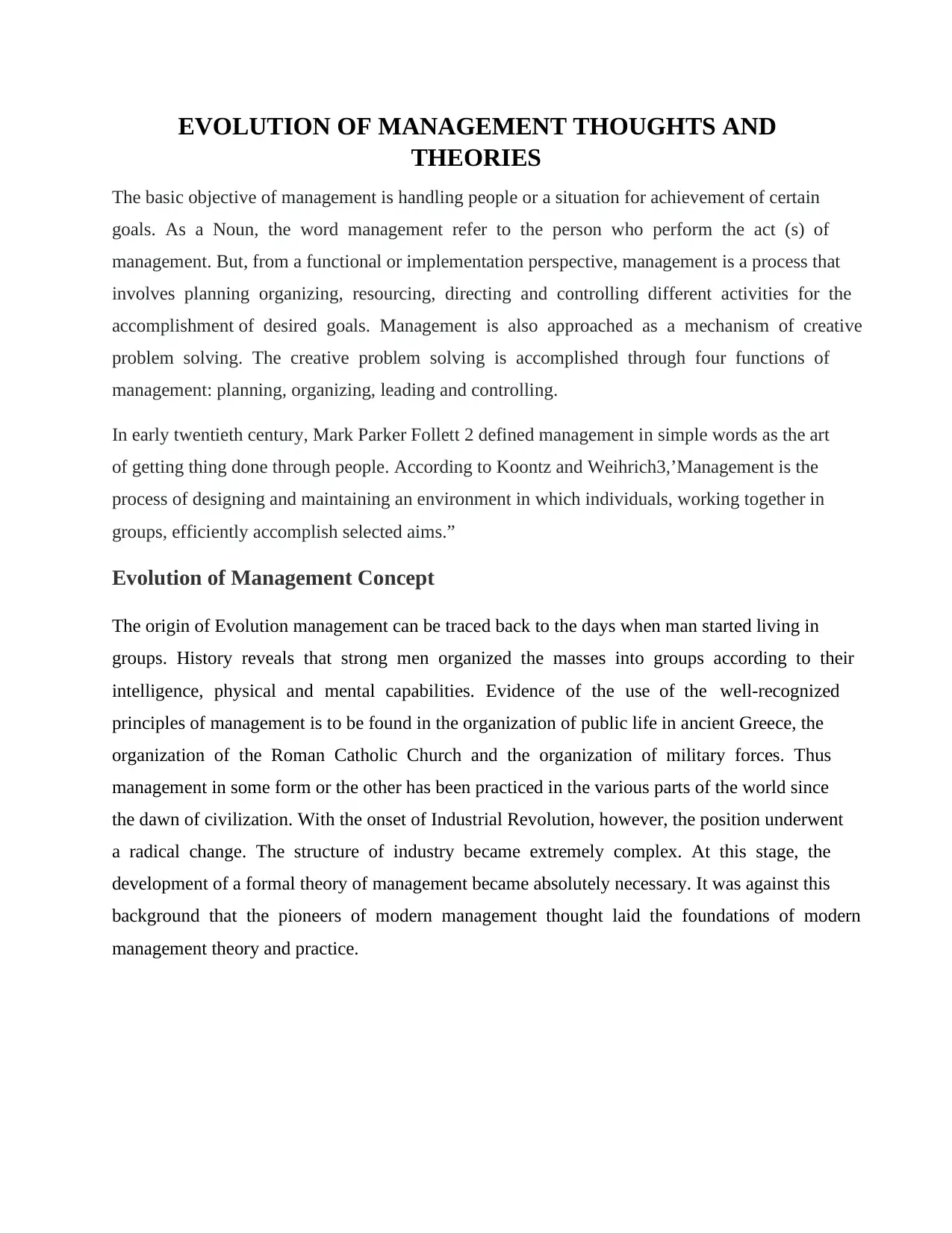
EVOLUTION OF MANAGEMENT THOUGHTS AND
THEORIES
The basic objective of management is handling people or a situation for achievement of certain
goals. As a Noun, the word management refer to the person who perform the act (s) of
management. But, from a functional or implementation perspective, management is a process that
involves planning organizing, resourcing, directing and controlling different activities for the
accomplishment of desired goals. Management is also approached as a mechanism of creative
problem solving. The creative problem solving is accomplished through four functions of
management: planning, organizing, leading and controlling.
In early twentieth century, Mark Parker Follett 2 defined management in simple words as the art
of getting thing done through people. According to Koontz and Weihrich3,’Management is the
process of designing and maintaining an environment in which individuals, working together in
groups, efficiently accomplish selected aims.”
Evolution of Management Concept
The origin of Evolution management can be traced back to the days when man started living in
groups. History reveals that strong men organized the masses into groups according to their
intelligence, physical and mental capabilities. Evidence of the use of the well-recognized
principles of management is to be found in the organization of public life in ancient Greece, the
organization of the Roman Catholic Church and the organization of military forces. Thus
management in some form or the other has been practiced in the various parts of the world since
the dawn of civilization. With the onset of Industrial Revolution, however, the position underwent
a radical change. The structure of industry became extremely complex. At this stage, the
development of a formal theory of management became absolutely necessary. It was against this
background that the pioneers of modern management thought laid the foundations of modern
management theory and practice.
THEORIES
The basic objective of management is handling people or a situation for achievement of certain
goals. As a Noun, the word management refer to the person who perform the act (s) of
management. But, from a functional or implementation perspective, management is a process that
involves planning organizing, resourcing, directing and controlling different activities for the
accomplishment of desired goals. Management is also approached as a mechanism of creative
problem solving. The creative problem solving is accomplished through four functions of
management: planning, organizing, leading and controlling.
In early twentieth century, Mark Parker Follett 2 defined management in simple words as the art
of getting thing done through people. According to Koontz and Weihrich3,’Management is the
process of designing and maintaining an environment in which individuals, working together in
groups, efficiently accomplish selected aims.”
Evolution of Management Concept
The origin of Evolution management can be traced back to the days when man started living in
groups. History reveals that strong men organized the masses into groups according to their
intelligence, physical and mental capabilities. Evidence of the use of the well-recognized
principles of management is to be found in the organization of public life in ancient Greece, the
organization of the Roman Catholic Church and the organization of military forces. Thus
management in some form or the other has been practiced in the various parts of the world since
the dawn of civilization. With the onset of Industrial Revolution, however, the position underwent
a radical change. The structure of industry became extremely complex. At this stage, the
development of a formal theory of management became absolutely necessary. It was against this
background that the pioneers of modern management thought laid the foundations of modern
management theory and practice.
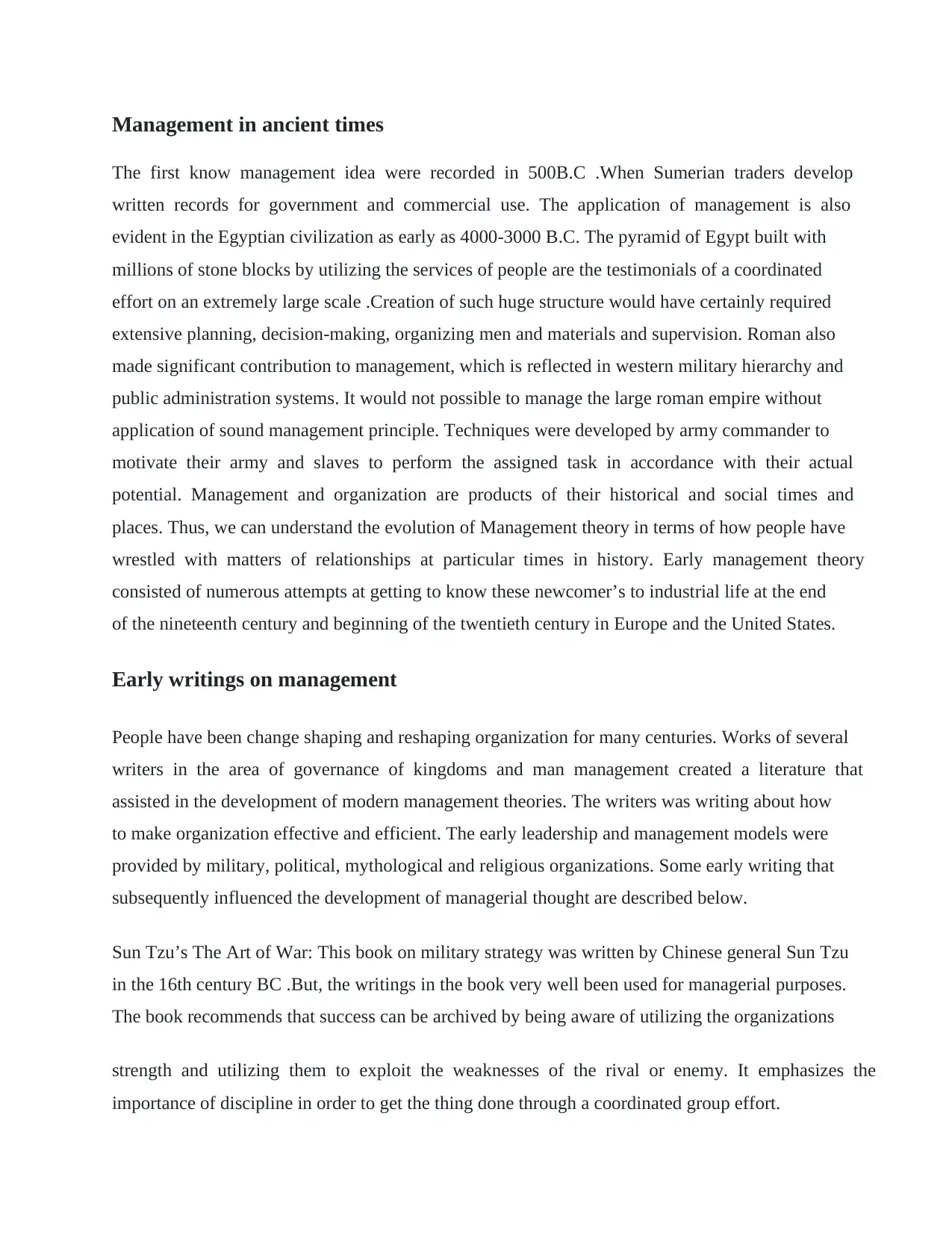
Management in ancient times
The first know management idea were recorded in 500B.C .When Sumerian traders develop
written records for government and commercial use. The application of management is also
evident in the Egyptian civilization as early as 4000-3000 B.C. The pyramid of Egypt built with
millions of stone blocks by utilizing the services of people are the testimonials of a coordinated
effort on an extremely large scale .Creation of such huge structure would have certainly required
extensive planning, decision-making, organizing men and materials and supervision. Roman also
made significant contribution to management, which is reflected in western military hierarchy and
public administration systems. It would not possible to manage the large roman empire without
application of sound management principle. Techniques were developed by army commander to
motivate their army and slaves to perform the assigned task in accordance with their actual
potential. Management and organization are products of their historical and social times and
places. Thus, we can understand the evolution of Management theory in terms of how people have
wrestled with matters of relationships at particular times in history. Early management theory
consisted of numerous attempts at getting to know these newcomer’s to industrial life at the end
of the nineteenth century and beginning of the twentieth century in Europe and the United States.
Early writings on management
People have been change shaping and reshaping organization for many centuries. Works of several
writers in the area of governance of kingdoms and man management created a literature that
assisted in the development of modern management theories. The writers was writing about how
to make organization effective and efficient. The early leadership and management models were
provided by military, political, mythological and religious organizations. Some early writing that
subsequently influenced the development of managerial thought are described below.
Sun Tzu’s The Art of War: This book on military strategy was written by Chinese general Sun Tzu
in the 16th century BC .But, the writings in the book very well been used for managerial purposes.
The book recommends that success can be archived by being aware of utilizing the organizations
strength and utilizing them to exploit the weaknesses of the rival or enemy. It emphasizes the
importance of discipline in order to get the thing done through a coordinated group effort.
The first know management idea were recorded in 500B.C .When Sumerian traders develop
written records for government and commercial use. The application of management is also
evident in the Egyptian civilization as early as 4000-3000 B.C. The pyramid of Egypt built with
millions of stone blocks by utilizing the services of people are the testimonials of a coordinated
effort on an extremely large scale .Creation of such huge structure would have certainly required
extensive planning, decision-making, organizing men and materials and supervision. Roman also
made significant contribution to management, which is reflected in western military hierarchy and
public administration systems. It would not possible to manage the large roman empire without
application of sound management principle. Techniques were developed by army commander to
motivate their army and slaves to perform the assigned task in accordance with their actual
potential. Management and organization are products of their historical and social times and
places. Thus, we can understand the evolution of Management theory in terms of how people have
wrestled with matters of relationships at particular times in history. Early management theory
consisted of numerous attempts at getting to know these newcomer’s to industrial life at the end
of the nineteenth century and beginning of the twentieth century in Europe and the United States.
Early writings on management
People have been change shaping and reshaping organization for many centuries. Works of several
writers in the area of governance of kingdoms and man management created a literature that
assisted in the development of modern management theories. The writers was writing about how
to make organization effective and efficient. The early leadership and management models were
provided by military, political, mythological and religious organizations. Some early writing that
subsequently influenced the development of managerial thought are described below.
Sun Tzu’s The Art of War: This book on military strategy was written by Chinese general Sun Tzu
in the 16th century BC .But, the writings in the book very well been used for managerial purposes.
The book recommends that success can be archived by being aware of utilizing the organizations
strength and utilizing them to exploit the weaknesses of the rival or enemy. It emphasizes the
importance of discipline in order to get the thing done through a coordinated group effort.
⊘ This is a preview!⊘
Do you want full access?
Subscribe today to unlock all pages.

Trusted by 1+ million students worldwide
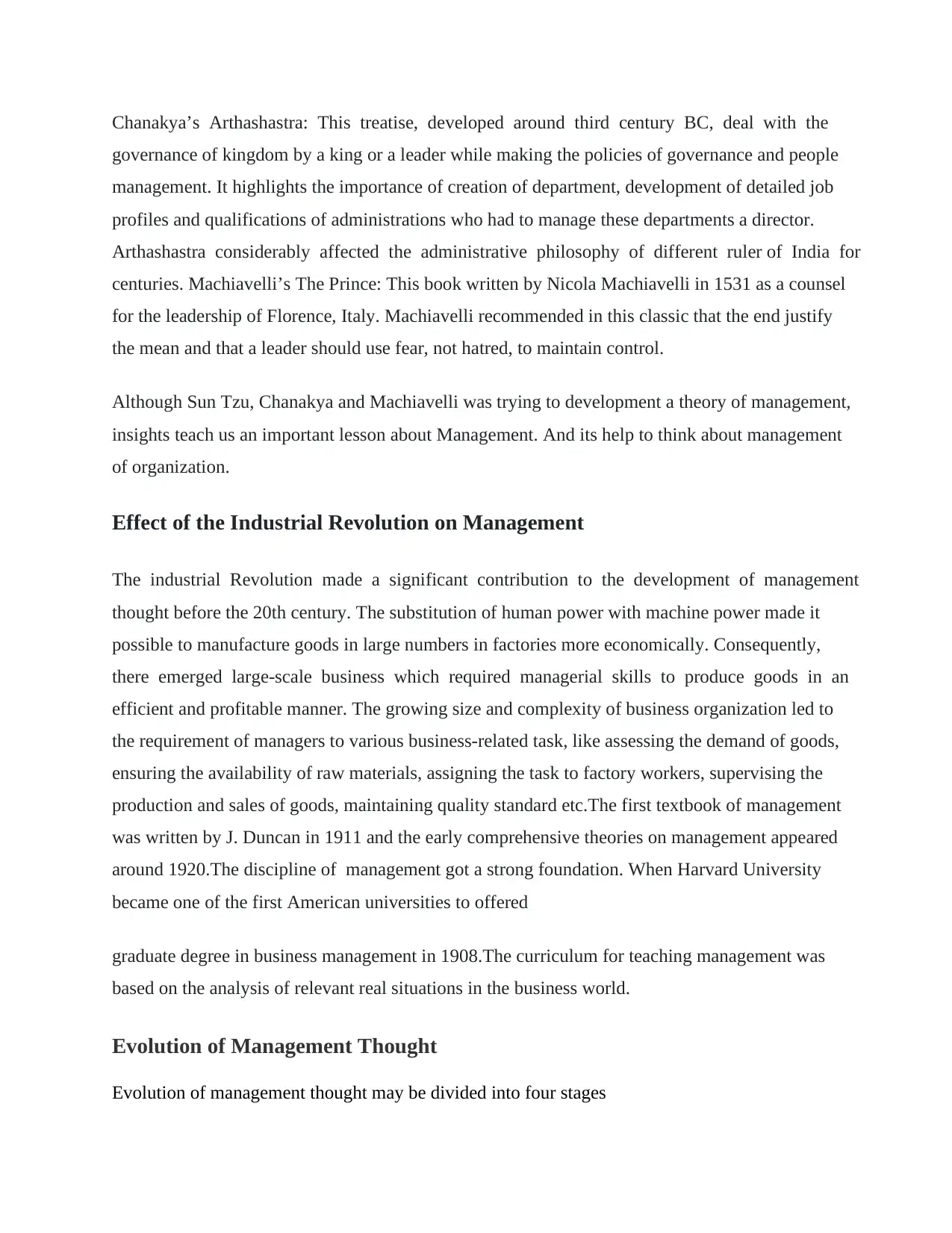
Chanakya’s Arthashastra: This treatise, developed around third century BC, deal with the
governance of kingdom by a king or a leader while making the policies of governance and people
management. It highlights the importance of creation of department, development of detailed job
profiles and qualifications of administrations who had to manage these departments a director.
Arthashastra considerably affected the administrative philosophy of different ruler of India for
centuries. Machiavelli’s The Prince: This book written by Nicola Machiavelli in 1531 as a counsel
for the leadership of Florence, Italy. Machiavelli recommended in this classic that the end justify
the mean and that a leader should use fear, not hatred, to maintain control.
Although Sun Tzu, Chanakya and Machiavelli was trying to development a theory of management,
insights teach us an important lesson about Management. And its help to think about management
of organization.
Effect of the Industrial Revolution on Management
The industrial Revolution made a significant contribution to the development of management
thought before the 20th century. The substitution of human power with machine power made it
possible to manufacture goods in large numbers in factories more economically. Consequently,
there emerged large-scale business which required managerial skills to produce goods in an
efficient and profitable manner. The growing size and complexity of business organization led to
the requirement of managers to various business-related task, like assessing the demand of goods,
ensuring the availability of raw materials, assigning the task to factory workers, supervising the
production and sales of goods, maintaining quality standard etc.The first textbook of management
was written by J. Duncan in 1911 and the early comprehensive theories on management appeared
around 1920.The discipline of management got a strong foundation. When Harvard University
became one of the first American universities to offered
graduate degree in business management in 1908.The curriculum for teaching management was
based on the analysis of relevant real situations in the business world.
Evolution of Management Thought
Evolution of management thought may be divided into four stages
governance of kingdom by a king or a leader while making the policies of governance and people
management. It highlights the importance of creation of department, development of detailed job
profiles and qualifications of administrations who had to manage these departments a director.
Arthashastra considerably affected the administrative philosophy of different ruler of India for
centuries. Machiavelli’s The Prince: This book written by Nicola Machiavelli in 1531 as a counsel
for the leadership of Florence, Italy. Machiavelli recommended in this classic that the end justify
the mean and that a leader should use fear, not hatred, to maintain control.
Although Sun Tzu, Chanakya and Machiavelli was trying to development a theory of management,
insights teach us an important lesson about Management. And its help to think about management
of organization.
Effect of the Industrial Revolution on Management
The industrial Revolution made a significant contribution to the development of management
thought before the 20th century. The substitution of human power with machine power made it
possible to manufacture goods in large numbers in factories more economically. Consequently,
there emerged large-scale business which required managerial skills to produce goods in an
efficient and profitable manner. The growing size and complexity of business organization led to
the requirement of managers to various business-related task, like assessing the demand of goods,
ensuring the availability of raw materials, assigning the task to factory workers, supervising the
production and sales of goods, maintaining quality standard etc.The first textbook of management
was written by J. Duncan in 1911 and the early comprehensive theories on management appeared
around 1920.The discipline of management got a strong foundation. When Harvard University
became one of the first American universities to offered
graduate degree in business management in 1908.The curriculum for teaching management was
based on the analysis of relevant real situations in the business world.
Evolution of Management Thought
Evolution of management thought may be divided into four stages
Paraphrase This Document
Need a fresh take? Get an instant paraphrase of this document with our AI Paraphraser
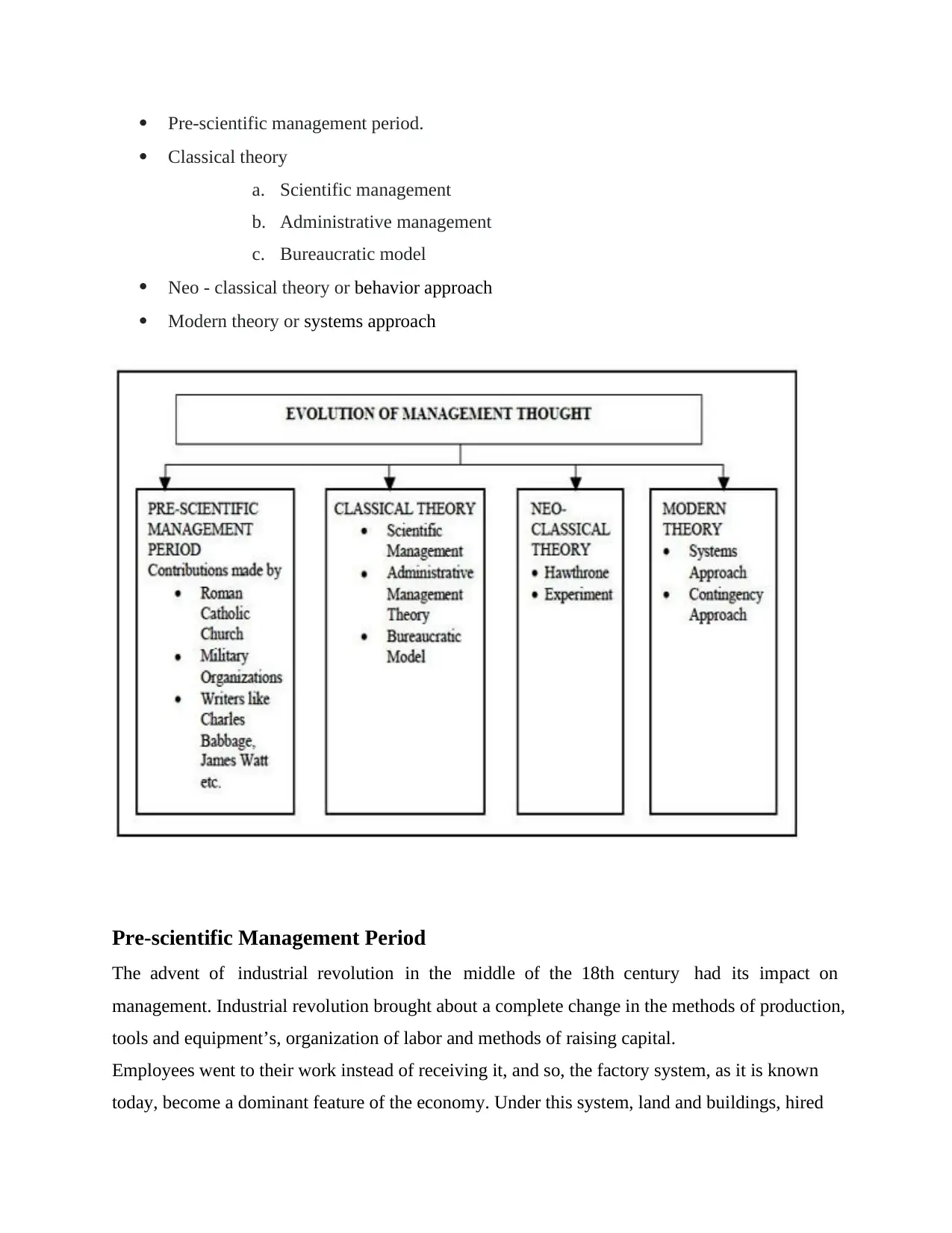
Pre-scientific management period.
Classical theory
a. Scientific management
b. Administrative management
c. Bureaucratic model
Neo - classical theory or behavior approach
Modern theory or systems approach
Pre-scientific Management Period
The advent of industrial revolution in the middle of the 18th century had its impact on
management. Industrial revolution brought about a complete change in the methods of production,
tools and equipment’s, organization of labor and methods of raising capital.
Employees went to their work instead of receiving it, and so, the factory system, as it is known
today, become a dominant feature of the economy. Under this system, land and buildings, hired
Classical theory
a. Scientific management
b. Administrative management
c. Bureaucratic model
Neo - classical theory or behavior approach
Modern theory or systems approach
Pre-scientific Management Period
The advent of industrial revolution in the middle of the 18th century had its impact on
management. Industrial revolution brought about a complete change in the methods of production,
tools and equipment’s, organization of labor and methods of raising capital.
Employees went to their work instead of receiving it, and so, the factory system, as it is known
today, become a dominant feature of the economy. Under this system, land and buildings, hired
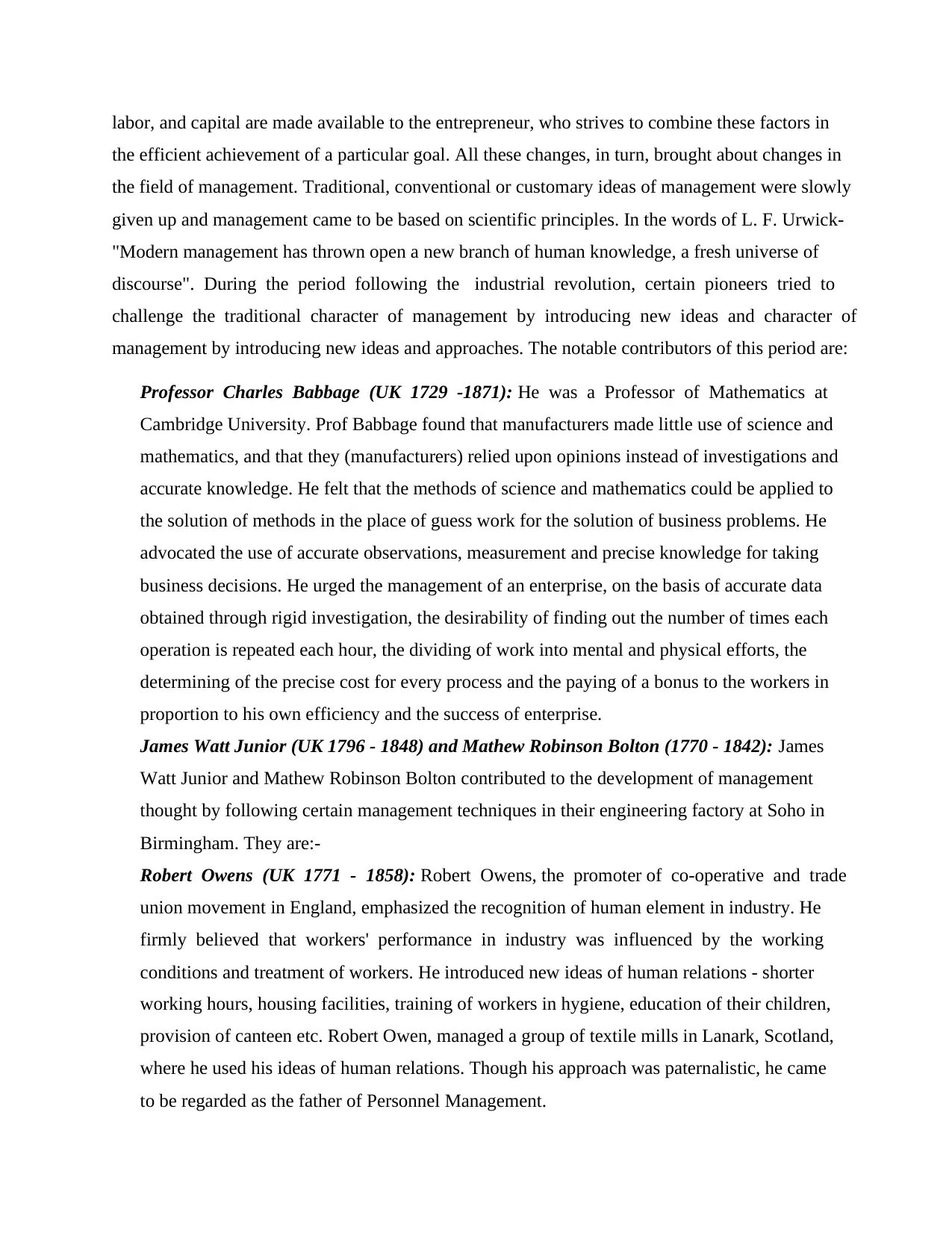
labor, and capital are made available to the entrepreneur, who strives to combine these factors in
the efficient achievement of a particular goal. All these changes, in turn, brought about changes in
the field of management. Traditional, conventional or customary ideas of management were slowly
given up and management came to be based on scientific principles. In the words of L. F. Urwick-
"Modern management has thrown open a new branch of human knowledge, a fresh universe of
discourse". During the period following the industrial revolution, certain pioneers tried to
challenge the traditional character of management by introducing new ideas and character of
management by introducing new ideas and approaches. The notable contributors of this period are:
Professor Charles Babbage (UK 1729 -1871): He was a Professor of Mathematics at
Cambridge University. Prof Babbage found that manufacturers made little use of science and
mathematics, and that they (manufacturers) relied upon opinions instead of investigations and
accurate knowledge. He felt that the methods of science and mathematics could be applied to
the solution of methods in the place of guess work for the solution of business problems. He
advocated the use of accurate observations, measurement and precise knowledge for taking
business decisions. He urged the management of an enterprise, on the basis of accurate data
obtained through rigid investigation, the desirability of finding out the number of times each
operation is repeated each hour, the dividing of work into mental and physical efforts, the
determining of the precise cost for every process and the paying of a bonus to the workers in
proportion to his own efficiency and the success of enterprise.
James Watt Junior (UK 1796 - 1848) and Mathew Robinson Bolton (1770 - 1842): James
Watt Junior and Mathew Robinson Bolton contributed to the development of management
thought by following certain management techniques in their engineering factory at Soho in
Birmingham. They are:-
Robert Owens (UK 1771 - 1858): Robert Owens, the promoter of co-operative and trade
union movement in England, emphasized the recognition of human element in industry. He
firmly believed that workers' performance in industry was influenced by the working
conditions and treatment of workers. He introduced new ideas of human relations - shorter
working hours, housing facilities, training of workers in hygiene, education of their children,
provision of canteen etc. Robert Owen, managed a group of textile mills in Lanark, Scotland,
where he used his ideas of human relations. Though his approach was paternalistic, he came
to be regarded as the father of Personnel Management.
the efficient achievement of a particular goal. All these changes, in turn, brought about changes in
the field of management. Traditional, conventional or customary ideas of management were slowly
given up and management came to be based on scientific principles. In the words of L. F. Urwick-
"Modern management has thrown open a new branch of human knowledge, a fresh universe of
discourse". During the period following the industrial revolution, certain pioneers tried to
challenge the traditional character of management by introducing new ideas and character of
management by introducing new ideas and approaches. The notable contributors of this period are:
Professor Charles Babbage (UK 1729 -1871): He was a Professor of Mathematics at
Cambridge University. Prof Babbage found that manufacturers made little use of science and
mathematics, and that they (manufacturers) relied upon opinions instead of investigations and
accurate knowledge. He felt that the methods of science and mathematics could be applied to
the solution of methods in the place of guess work for the solution of business problems. He
advocated the use of accurate observations, measurement and precise knowledge for taking
business decisions. He urged the management of an enterprise, on the basis of accurate data
obtained through rigid investigation, the desirability of finding out the number of times each
operation is repeated each hour, the dividing of work into mental and physical efforts, the
determining of the precise cost for every process and the paying of a bonus to the workers in
proportion to his own efficiency and the success of enterprise.
James Watt Junior (UK 1796 - 1848) and Mathew Robinson Bolton (1770 - 1842): James
Watt Junior and Mathew Robinson Bolton contributed to the development of management
thought by following certain management techniques in their engineering factory at Soho in
Birmingham. They are:-
Robert Owens (UK 1771 - 1858): Robert Owens, the promoter of co-operative and trade
union movement in England, emphasized the recognition of human element in industry. He
firmly believed that workers' performance in industry was influenced by the working
conditions and treatment of workers. He introduced new ideas of human relations - shorter
working hours, housing facilities, training of workers in hygiene, education of their children,
provision of canteen etc. Robert Owen, managed a group of textile mills in Lanark, Scotland,
where he used his ideas of human relations. Though his approach was paternalistic, he came
to be regarded as the father of Personnel Management.
⊘ This is a preview!⊘
Do you want full access?
Subscribe today to unlock all pages.

Trusted by 1+ million students worldwide
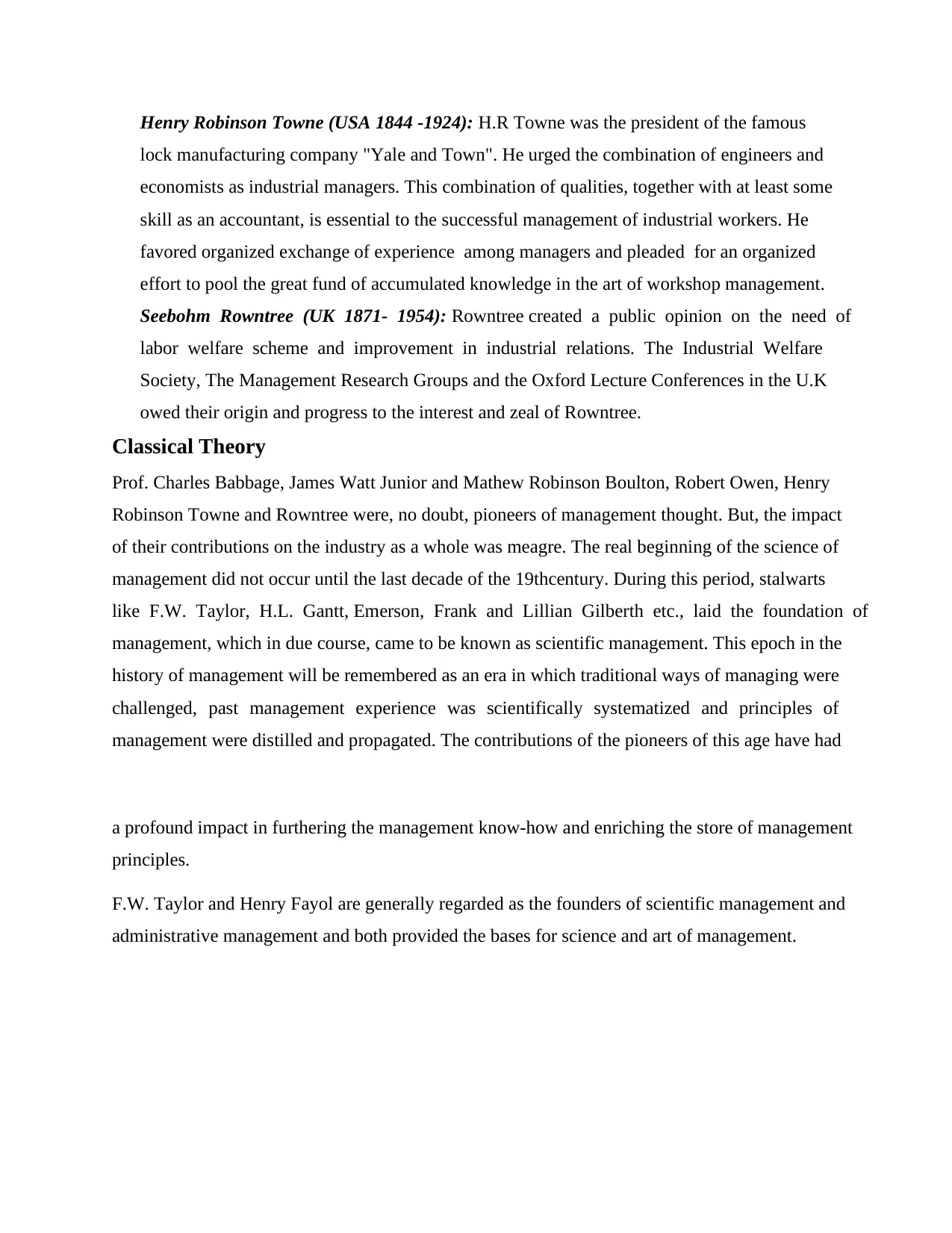
Henry Robinson Towne (USA 1844 -1924): H.R Towne was the president of the famous
lock manufacturing company "Yale and Town". He urged the combination of engineers and
economists as industrial managers. This combination of qualities, together with at least some
skill as an accountant, is essential to the successful management of industrial workers. He
favored organized exchange of experience among managers and pleaded for an organized
effort to pool the great fund of accumulated knowledge in the art of workshop management.
Seebohm Rowntree (UK 1871- 1954): Rowntree created a public opinion on the need of
labor welfare scheme and improvement in industrial relations. The Industrial Welfare
Society, The Management Research Groups and the Oxford Lecture Conferences in the U.K
owed their origin and progress to the interest and zeal of Rowntree.
Classical Theory
Prof. Charles Babbage, James Watt Junior and Mathew Robinson Boulton, Robert Owen, Henry
Robinson Towne and Rowntree were, no doubt, pioneers of management thought. But, the impact
of their contributions on the industry as a whole was meagre. The real beginning of the science of
management did not occur until the last decade of the 19thcentury. During this period, stalwarts
like F.W. Taylor, H.L. Gantt, Emerson, Frank and Lillian Gilberth etc., laid the foundation of
management, which in due course, came to be known as scientific management. This epoch in the
history of management will be remembered as an era in which traditional ways of managing were
challenged, past management experience was scientifically systematized and principles of
management were distilled and propagated. The contributions of the pioneers of this age have had
a profound impact in furthering the management know-how and enriching the store of management
principles.
F.W. Taylor and Henry Fayol are generally regarded as the founders of scientific management and
administrative management and both provided the bases for science and art of management.
lock manufacturing company "Yale and Town". He urged the combination of engineers and
economists as industrial managers. This combination of qualities, together with at least some
skill as an accountant, is essential to the successful management of industrial workers. He
favored organized exchange of experience among managers and pleaded for an organized
effort to pool the great fund of accumulated knowledge in the art of workshop management.
Seebohm Rowntree (UK 1871- 1954): Rowntree created a public opinion on the need of
labor welfare scheme and improvement in industrial relations. The Industrial Welfare
Society, The Management Research Groups and the Oxford Lecture Conferences in the U.K
owed their origin and progress to the interest and zeal of Rowntree.
Classical Theory
Prof. Charles Babbage, James Watt Junior and Mathew Robinson Boulton, Robert Owen, Henry
Robinson Towne and Rowntree were, no doubt, pioneers of management thought. But, the impact
of their contributions on the industry as a whole was meagre. The real beginning of the science of
management did not occur until the last decade of the 19thcentury. During this period, stalwarts
like F.W. Taylor, H.L. Gantt, Emerson, Frank and Lillian Gilberth etc., laid the foundation of
management, which in due course, came to be known as scientific management. This epoch in the
history of management will be remembered as an era in which traditional ways of managing were
challenged, past management experience was scientifically systematized and principles of
management were distilled and propagated. The contributions of the pioneers of this age have had
a profound impact in furthering the management know-how and enriching the store of management
principles.
F.W. Taylor and Henry Fayol are generally regarded as the founders of scientific management and
administrative management and both provided the bases for science and art of management.
Paraphrase This Document
Need a fresh take? Get an instant paraphrase of this document with our AI Paraphraser
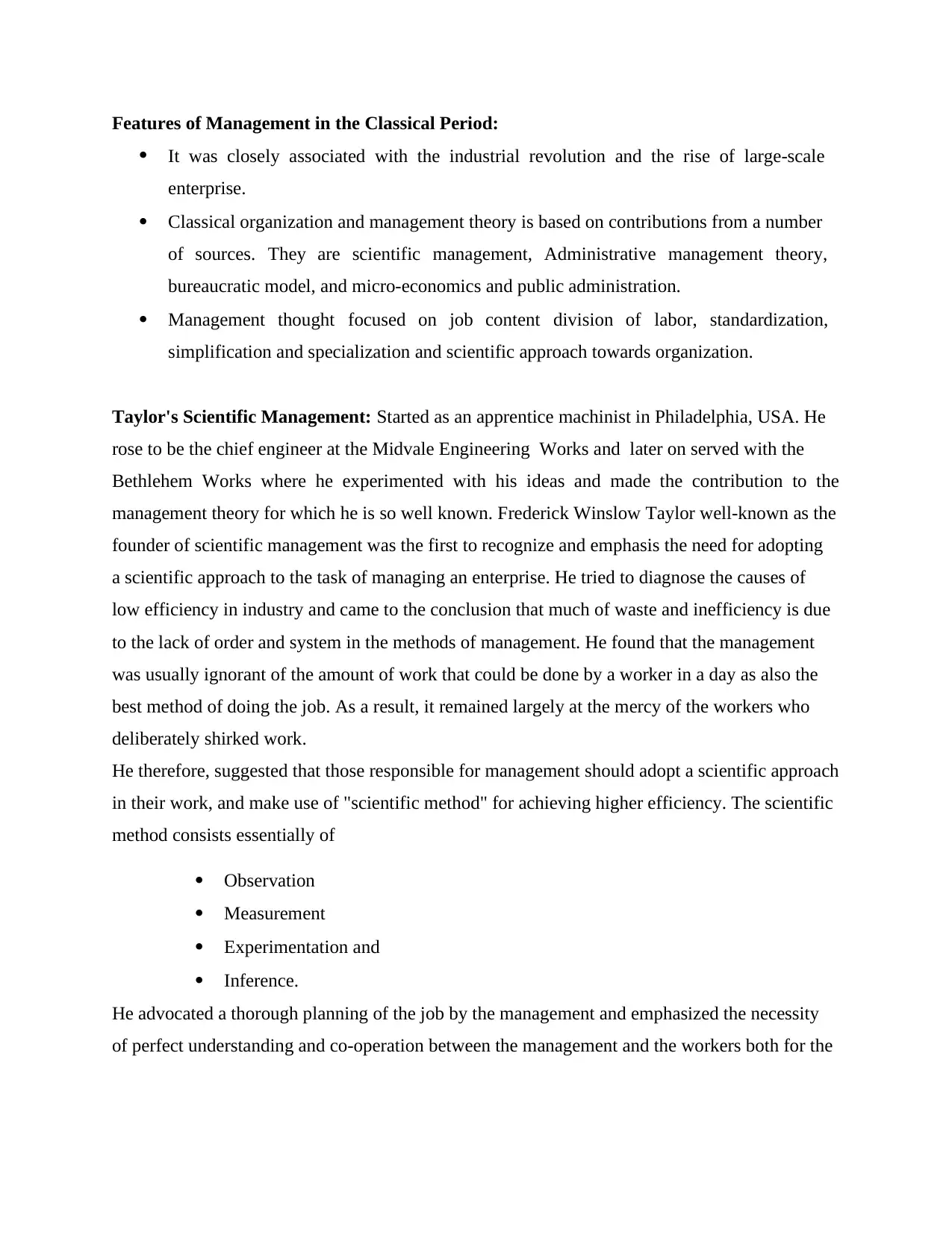
Features of Management in the Classical Period:
It was closely associated with the industrial revolution and the rise of large-scale
enterprise.
Classical organization and management theory is based on contributions from a number
of sources. They are scientific management, Administrative management theory,
bureaucratic model, and micro-economics and public administration.
Management thought focused on job content division of labor, standardization,
simplification and specialization and scientific approach towards organization.
Taylor's Scientific Management: Started as an apprentice machinist in Philadelphia, USA. He
rose to be the chief engineer at the Midvale Engineering Works and later on served with the
Bethlehem Works where he experimented with his ideas and made the contribution to the
management theory for which he is so well known. Frederick Winslow Taylor well-known as the
founder of scientific management was the first to recognize and emphasis the need for adopting
a scientific approach to the task of managing an enterprise. He tried to diagnose the causes of
low efficiency in industry and came to the conclusion that much of waste and inefficiency is due
to the lack of order and system in the methods of management. He found that the management
was usually ignorant of the amount of work that could be done by a worker in a day as also the
best method of doing the job. As a result, it remained largely at the mercy of the workers who
deliberately shirked work.
He therefore, suggested that those responsible for management should adopt a scientific approach
in their work, and make use of "scientific method" for achieving higher efficiency. The scientific
method consists essentially of
Observation
Measurement
Experimentation and
Inference.
He advocated a thorough planning of the job by the management and emphasized the necessity
of perfect understanding and co-operation between the management and the workers both for the
It was closely associated with the industrial revolution and the rise of large-scale
enterprise.
Classical organization and management theory is based on contributions from a number
of sources. They are scientific management, Administrative management theory,
bureaucratic model, and micro-economics and public administration.
Management thought focused on job content division of labor, standardization,
simplification and specialization and scientific approach towards organization.
Taylor's Scientific Management: Started as an apprentice machinist in Philadelphia, USA. He
rose to be the chief engineer at the Midvale Engineering Works and later on served with the
Bethlehem Works where he experimented with his ideas and made the contribution to the
management theory for which he is so well known. Frederick Winslow Taylor well-known as the
founder of scientific management was the first to recognize and emphasis the need for adopting
a scientific approach to the task of managing an enterprise. He tried to diagnose the causes of
low efficiency in industry and came to the conclusion that much of waste and inefficiency is due
to the lack of order and system in the methods of management. He found that the management
was usually ignorant of the amount of work that could be done by a worker in a day as also the
best method of doing the job. As a result, it remained largely at the mercy of the workers who
deliberately shirked work.
He therefore, suggested that those responsible for management should adopt a scientific approach
in their work, and make use of "scientific method" for achieving higher efficiency. The scientific
method consists essentially of
Observation
Measurement
Experimentation and
Inference.
He advocated a thorough planning of the job by the management and emphasized the necessity
of perfect understanding and co-operation between the management and the workers both for the
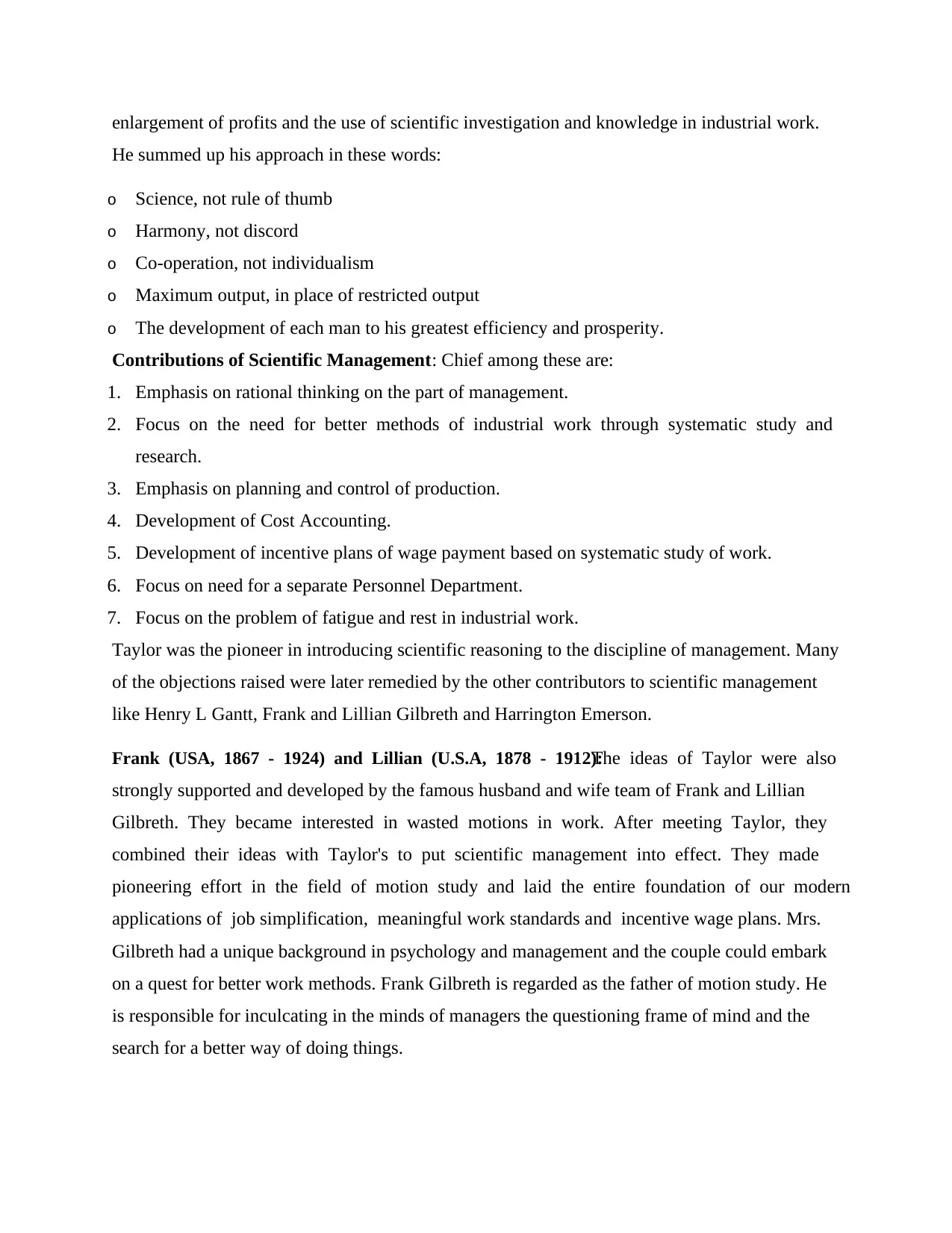
enlargement of profits and the use of scientific investigation and knowledge in industrial work.
He summed up his approach in these words:
o Science, not rule of thumb
o Harmony, not discord
o Co-operation, not individualism
o Maximum output, in place of restricted output
o The development of each man to his greatest efficiency and prosperity.
Contributions of Scientific Management: Chief among these are:
1. Emphasis on rational thinking on the part of management.
2. Focus on the need for better methods of industrial work through systematic study and
research.
3. Emphasis on planning and control of production.
4. Development of Cost Accounting.
5. Development of incentive plans of wage payment based on systematic study of work.
6. Focus on need for a separate Personnel Department.
7. Focus on the problem of fatigue and rest in industrial work.
Taylor was the pioneer in introducing scientific reasoning to the discipline of management. Many
of the objections raised were later remedied by the other contributors to scientific management
like Henry L Gantt, Frank and Lillian Gilbreth and Harrington Emerson.
Frank (USA, 1867 - 1924) and Lillian (U.S.A, 1878 - 1912):The ideas of Taylor were also
strongly supported and developed by the famous husband and wife team of Frank and Lillian
Gilbreth. They became interested in wasted motions in work. After meeting Taylor, they
combined their ideas with Taylor's to put scientific management into effect. They made
pioneering effort in the field of motion study and laid the entire foundation of our modern
applications of job simplification, meaningful work standards and incentive wage plans. Mrs.
Gilbreth had a unique background in psychology and management and the couple could embark
on a quest for better work methods. Frank Gilbreth is regarded as the father of motion study. He
is responsible for inculcating in the minds of managers the questioning frame of mind and the
search for a better way of doing things.
He summed up his approach in these words:
o Science, not rule of thumb
o Harmony, not discord
o Co-operation, not individualism
o Maximum output, in place of restricted output
o The development of each man to his greatest efficiency and prosperity.
Contributions of Scientific Management: Chief among these are:
1. Emphasis on rational thinking on the part of management.
2. Focus on the need for better methods of industrial work through systematic study and
research.
3. Emphasis on planning and control of production.
4. Development of Cost Accounting.
5. Development of incentive plans of wage payment based on systematic study of work.
6. Focus on need for a separate Personnel Department.
7. Focus on the problem of fatigue and rest in industrial work.
Taylor was the pioneer in introducing scientific reasoning to the discipline of management. Many
of the objections raised were later remedied by the other contributors to scientific management
like Henry L Gantt, Frank and Lillian Gilbreth and Harrington Emerson.
Frank (USA, 1867 - 1924) and Lillian (U.S.A, 1878 - 1912):The ideas of Taylor were also
strongly supported and developed by the famous husband and wife team of Frank and Lillian
Gilbreth. They became interested in wasted motions in work. After meeting Taylor, they
combined their ideas with Taylor's to put scientific management into effect. They made
pioneering effort in the field of motion study and laid the entire foundation of our modern
applications of job simplification, meaningful work standards and incentive wage plans. Mrs.
Gilbreth had a unique background in psychology and management and the couple could embark
on a quest for better work methods. Frank Gilbreth is regarded as the father of motion study. He
is responsible for inculcating in the minds of managers the questioning frame of mind and the
search for a better way of doing things.
⊘ This is a preview!⊘
Do you want full access?
Subscribe today to unlock all pages.

Trusted by 1+ million students worldwide
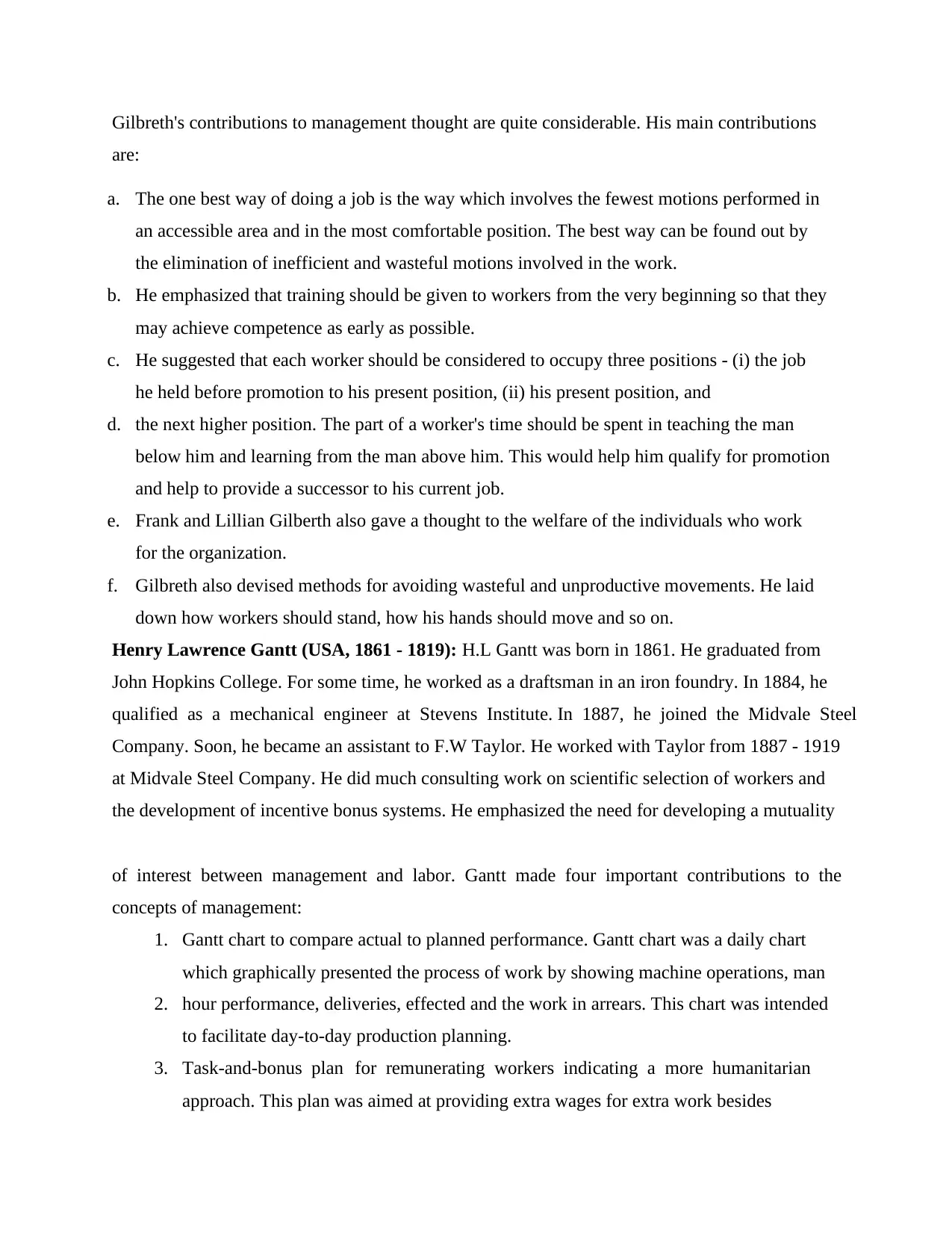
Gilbreth's contributions to management thought are quite considerable. His main contributions
are:
a. The one best way of doing a job is the way which involves the fewest motions performed in
an accessible area and in the most comfortable position. The best way can be found out by
the elimination of inefficient and wasteful motions involved in the work.
b. He emphasized that training should be given to workers from the very beginning so that they
may achieve competence as early as possible.
c. He suggested that each worker should be considered to occupy three positions - (i) the job
he held before promotion to his present position, (ii) his present position, and
d. the next higher position. The part of a worker's time should be spent in teaching the man
below him and learning from the man above him. This would help him qualify for promotion
and help to provide a successor to his current job.
e. Frank and Lillian Gilberth also gave a thought to the welfare of the individuals who work
for the organization.
f. Gilbreth also devised methods for avoiding wasteful and unproductive movements. He laid
down how workers should stand, how his hands should move and so on.
Henry Lawrence Gantt (USA, 1861 - 1819): H.L Gantt was born in 1861. He graduated from
John Hopkins College. For some time, he worked as a draftsman in an iron foundry. In 1884, he
qualified as a mechanical engineer at Stevens Institute. In 1887, he joined the Midvale Steel
Company. Soon, he became an assistant to F.W Taylor. He worked with Taylor from 1887 - 1919
at Midvale Steel Company. He did much consulting work on scientific selection of workers and
the development of incentive bonus systems. He emphasized the need for developing a mutuality
of interest between management and labor. Gantt made four important contributions to the
concepts of management:
1. Gantt chart to compare actual to planned performance. Gantt chart was a daily chart
which graphically presented the process of work by showing machine operations, man
2. hour performance, deliveries, effected and the work in arrears. This chart was intended
to facilitate day-to-day production planning.
3. Task-and-bonus plan for remunerating workers indicating a more humanitarian
approach. This plan was aimed at providing extra wages for extra work besides
are:
a. The one best way of doing a job is the way which involves the fewest motions performed in
an accessible area and in the most comfortable position. The best way can be found out by
the elimination of inefficient and wasteful motions involved in the work.
b. He emphasized that training should be given to workers from the very beginning so that they
may achieve competence as early as possible.
c. He suggested that each worker should be considered to occupy three positions - (i) the job
he held before promotion to his present position, (ii) his present position, and
d. the next higher position. The part of a worker's time should be spent in teaching the man
below him and learning from the man above him. This would help him qualify for promotion
and help to provide a successor to his current job.
e. Frank and Lillian Gilberth also gave a thought to the welfare of the individuals who work
for the organization.
f. Gilbreth also devised methods for avoiding wasteful and unproductive movements. He laid
down how workers should stand, how his hands should move and so on.
Henry Lawrence Gantt (USA, 1861 - 1819): H.L Gantt was born in 1861. He graduated from
John Hopkins College. For some time, he worked as a draftsman in an iron foundry. In 1884, he
qualified as a mechanical engineer at Stevens Institute. In 1887, he joined the Midvale Steel
Company. Soon, he became an assistant to F.W Taylor. He worked with Taylor from 1887 - 1919
at Midvale Steel Company. He did much consulting work on scientific selection of workers and
the development of incentive bonus systems. He emphasized the need for developing a mutuality
of interest between management and labor. Gantt made four important contributions to the
concepts of management:
1. Gantt chart to compare actual to planned performance. Gantt chart was a daily chart
which graphically presented the process of work by showing machine operations, man
2. hour performance, deliveries, effected and the work in arrears. This chart was intended
to facilitate day-to-day production planning.
3. Task-and-bonus plan for remunerating workers indicating a more humanitarian
approach. This plan was aimed at providing extra wages for extra work besides
Paraphrase This Document
Need a fresh take? Get an instant paraphrase of this document with our AI Paraphraser
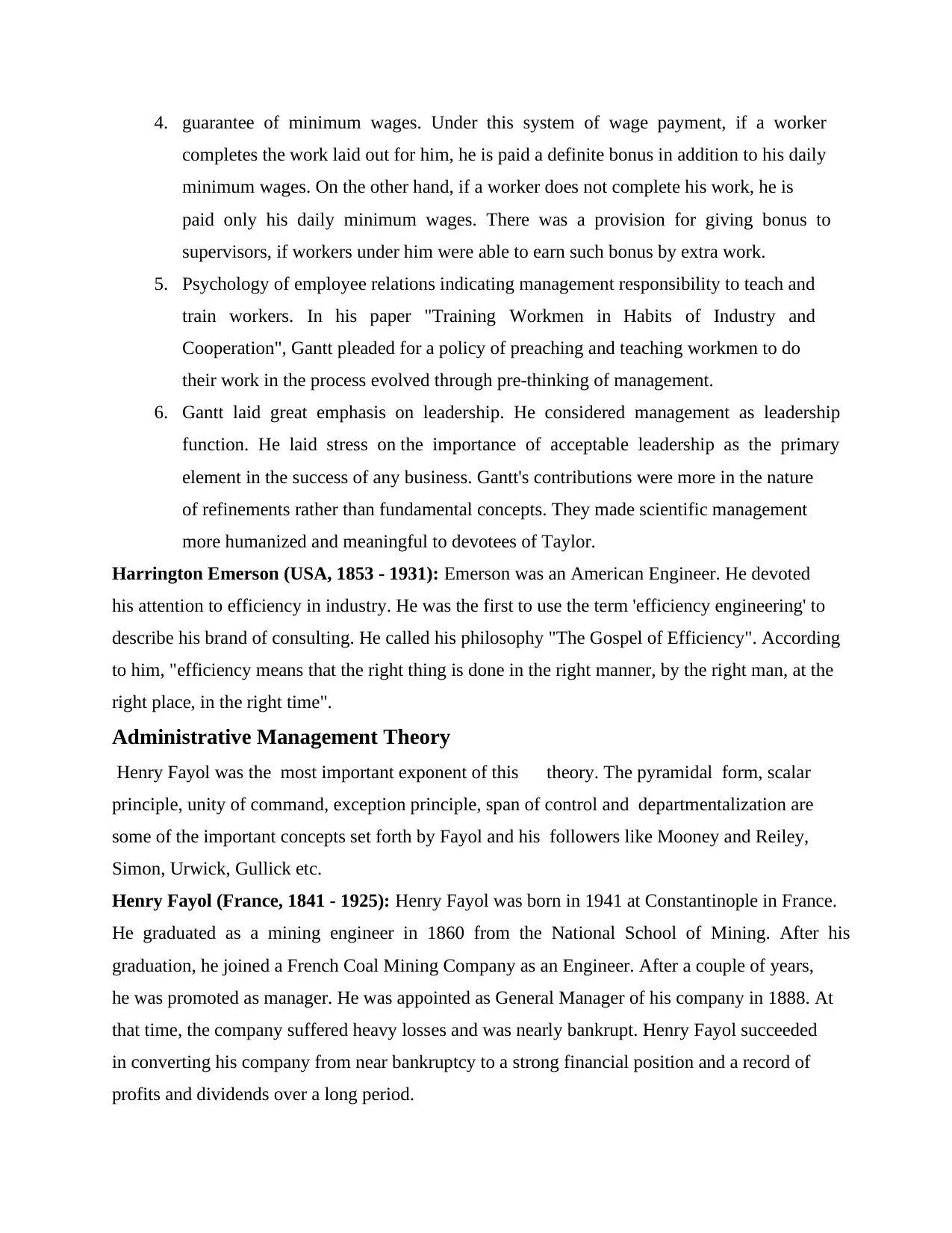
4. guarantee of minimum wages. Under this system of wage payment, if a worker
completes the work laid out for him, he is paid a definite bonus in addition to his daily
minimum wages. On the other hand, if a worker does not complete his work, he is
paid only his daily minimum wages. There was a provision for giving bonus to
supervisors, if workers under him were able to earn such bonus by extra work.
5. Psychology of employee relations indicating management responsibility to teach and
train workers. In his paper "Training Workmen in Habits of Industry and
Cooperation", Gantt pleaded for a policy of preaching and teaching workmen to do
their work in the process evolved through pre-thinking of management.
6. Gantt laid great emphasis on leadership. He considered management as leadership
function. He laid stress on the importance of acceptable leadership as the primary
element in the success of any business. Gantt's contributions were more in the nature
of refinements rather than fundamental concepts. They made scientific management
more humanized and meaningful to devotees of Taylor.
Harrington Emerson (USA, 1853 - 1931): Emerson was an American Engineer. He devoted
his attention to efficiency in industry. He was the first to use the term 'efficiency engineering' to
describe his brand of consulting. He called his philosophy "The Gospel of Efficiency". According
to him, "efficiency means that the right thing is done in the right manner, by the right man, at the
right place, in the right time".
Administrative Management Theory
Henry Fayol was the most important exponent of this theory. The pyramidal form, scalar
principle, unity of command, exception principle, span of control and departmentalization are
some of the important concepts set forth by Fayol and his followers like Mooney and Reiley,
Simon, Urwick, Gullick etc.
Henry Fayol (France, 1841 - 1925): Henry Fayol was born in 1941 at Constantinople in France.
He graduated as a mining engineer in 1860 from the National School of Mining. After his
graduation, he joined a French Coal Mining Company as an Engineer. After a couple of years,
he was promoted as manager. He was appointed as General Manager of his company in 1888. At
that time, the company suffered heavy losses and was nearly bankrupt. Henry Fayol succeeded
in converting his company from near bankruptcy to a strong financial position and a record of
profits and dividends over a long period.
completes the work laid out for him, he is paid a definite bonus in addition to his daily
minimum wages. On the other hand, if a worker does not complete his work, he is
paid only his daily minimum wages. There was a provision for giving bonus to
supervisors, if workers under him were able to earn such bonus by extra work.
5. Psychology of employee relations indicating management responsibility to teach and
train workers. In his paper "Training Workmen in Habits of Industry and
Cooperation", Gantt pleaded for a policy of preaching and teaching workmen to do
their work in the process evolved through pre-thinking of management.
6. Gantt laid great emphasis on leadership. He considered management as leadership
function. He laid stress on the importance of acceptable leadership as the primary
element in the success of any business. Gantt's contributions were more in the nature
of refinements rather than fundamental concepts. They made scientific management
more humanized and meaningful to devotees of Taylor.
Harrington Emerson (USA, 1853 - 1931): Emerson was an American Engineer. He devoted
his attention to efficiency in industry. He was the first to use the term 'efficiency engineering' to
describe his brand of consulting. He called his philosophy "The Gospel of Efficiency". According
to him, "efficiency means that the right thing is done in the right manner, by the right man, at the
right place, in the right time".
Administrative Management Theory
Henry Fayol was the most important exponent of this theory. The pyramidal form, scalar
principle, unity of command, exception principle, span of control and departmentalization are
some of the important concepts set forth by Fayol and his followers like Mooney and Reiley,
Simon, Urwick, Gullick etc.
Henry Fayol (France, 1841 - 1925): Henry Fayol was born in 1941 at Constantinople in France.
He graduated as a mining engineer in 1860 from the National School of Mining. After his
graduation, he joined a French Coal Mining Company as an Engineer. After a couple of years,
he was promoted as manager. He was appointed as General Manager of his company in 1888. At
that time, the company suffered heavy losses and was nearly bankrupt. Henry Fayol succeeded
in converting his company from near bankruptcy to a strong financial position and a record of
profits and dividends over a long period.
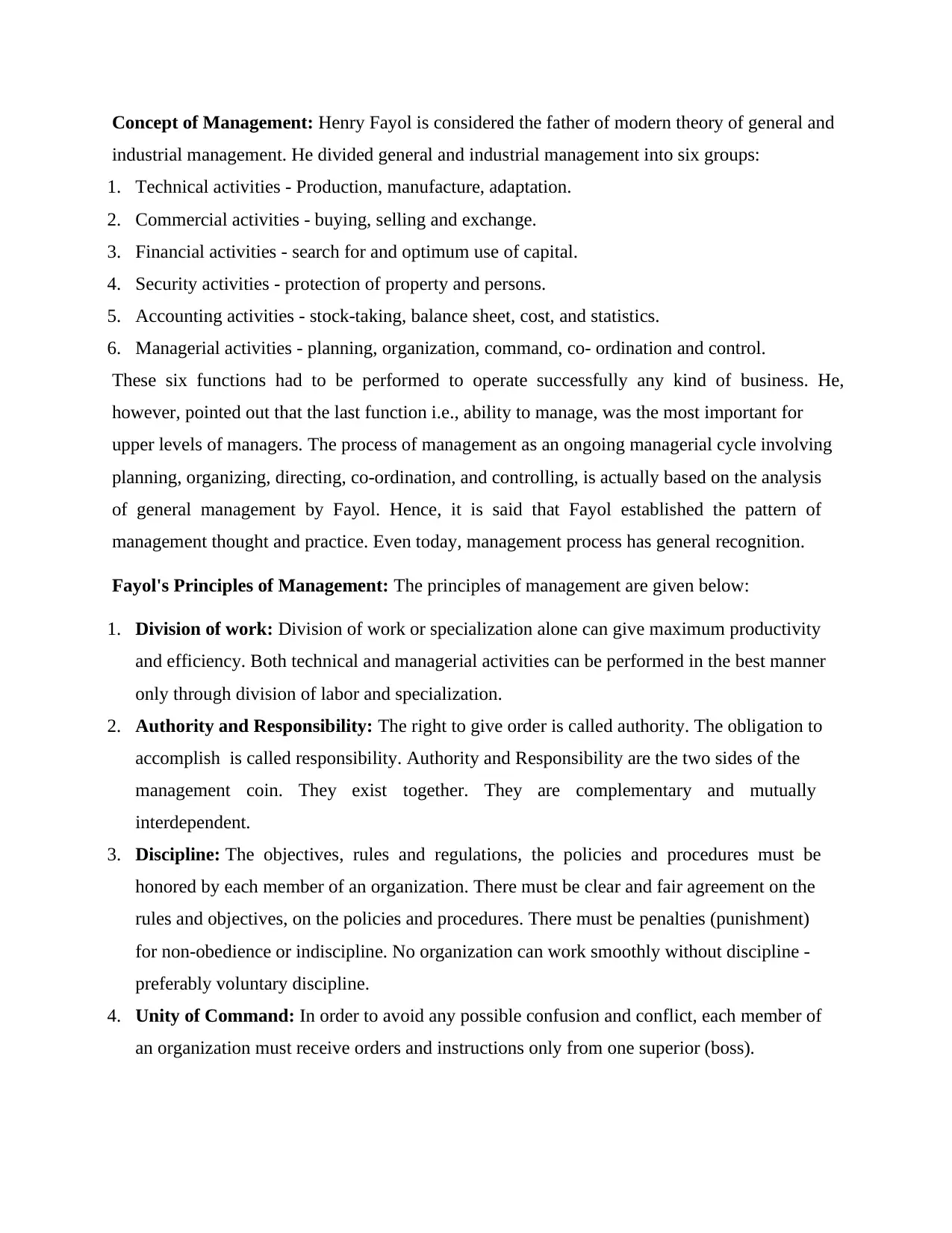
Concept of Management: Henry Fayol is considered the father of modern theory of general and
industrial management. He divided general and industrial management into six groups:
1. Technical activities - Production, manufacture, adaptation.
2. Commercial activities - buying, selling and exchange.
3. Financial activities - search for and optimum use of capital.
4. Security activities - protection of property and persons.
5. Accounting activities - stock-taking, balance sheet, cost, and statistics.
6. Managerial activities - planning, organization, command, co- ordination and control.
These six functions had to be performed to operate successfully any kind of business. He,
however, pointed out that the last function i.e., ability to manage, was the most important for
upper levels of managers. The process of management as an ongoing managerial cycle involving
planning, organizing, directing, co-ordination, and controlling, is actually based on the analysis
of general management by Fayol. Hence, it is said that Fayol established the pattern of
management thought and practice. Even today, management process has general recognition.
Fayol's Principles of Management: The principles of management are given below:
1. Division of work: Division of work or specialization alone can give maximum productivity
and efficiency. Both technical and managerial activities can be performed in the best manner
only through division of labor and specialization.
2. Authority and Responsibility: The right to give order is called authority. The obligation to
accomplish is called responsibility. Authority and Responsibility are the two sides of the
management coin. They exist together. They are complementary and mutually
interdependent.
3. Discipline: The objectives, rules and regulations, the policies and procedures must be
honored by each member of an organization. There must be clear and fair agreement on the
rules and objectives, on the policies and procedures. There must be penalties (punishment)
for non-obedience or indiscipline. No organization can work smoothly without discipline -
preferably voluntary discipline.
4. Unity of Command: In order to avoid any possible confusion and conflict, each member of
an organization must receive orders and instructions only from one superior (boss).
industrial management. He divided general and industrial management into six groups:
1. Technical activities - Production, manufacture, adaptation.
2. Commercial activities - buying, selling and exchange.
3. Financial activities - search for and optimum use of capital.
4. Security activities - protection of property and persons.
5. Accounting activities - stock-taking, balance sheet, cost, and statistics.
6. Managerial activities - planning, organization, command, co- ordination and control.
These six functions had to be performed to operate successfully any kind of business. He,
however, pointed out that the last function i.e., ability to manage, was the most important for
upper levels of managers. The process of management as an ongoing managerial cycle involving
planning, organizing, directing, co-ordination, and controlling, is actually based on the analysis
of general management by Fayol. Hence, it is said that Fayol established the pattern of
management thought and practice. Even today, management process has general recognition.
Fayol's Principles of Management: The principles of management are given below:
1. Division of work: Division of work or specialization alone can give maximum productivity
and efficiency. Both technical and managerial activities can be performed in the best manner
only through division of labor and specialization.
2. Authority and Responsibility: The right to give order is called authority. The obligation to
accomplish is called responsibility. Authority and Responsibility are the two sides of the
management coin. They exist together. They are complementary and mutually
interdependent.
3. Discipline: The objectives, rules and regulations, the policies and procedures must be
honored by each member of an organization. There must be clear and fair agreement on the
rules and objectives, on the policies and procedures. There must be penalties (punishment)
for non-obedience or indiscipline. No organization can work smoothly without discipline -
preferably voluntary discipline.
4. Unity of Command: In order to avoid any possible confusion and conflict, each member of
an organization must receive orders and instructions only from one superior (boss).
⊘ This is a preview!⊘
Do you want full access?
Subscribe today to unlock all pages.

Trusted by 1+ million students worldwide
1 out of 21
Your All-in-One AI-Powered Toolkit for Academic Success.
+13062052269
info@desklib.com
Available 24*7 on WhatsApp / Email
![[object Object]](/_next/static/media/star-bottom.7253800d.svg)
Unlock your academic potential
Copyright © 2020–2026 A2Z Services. All Rights Reserved. Developed and managed by ZUCOL.
